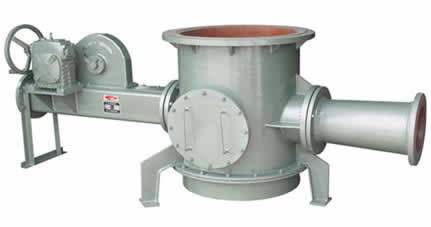


The Czech Republic, a landlocked nation situated in the heart of Europe, boasts a rich history intertwined with industrial innovation. Over the centuries, it has transformed from an agricultural society into a modern, industrialized nation, with significant contributions to various engineering and technological advancements. One of the critical elements that have played a crucial role in this transformation is the development and application of low pressure pneumatic conveying pumps. These systems have revolutionized material handling processes across multiple industries, contributing to the nation's economic growth and environmental sustainability.
Historical Context
The journey of pneumatic conveying technology in the Czech Republic dates back to the early 20th century when the country was part of the Austro-Hungarian Empire. During this period, the region experienced rapid industrialization, and there was a growing need for efficient methods of transporting materials within factories and between different production sites. The advent of pneumatic conveying systems provided a solution, offering a means to move bulk materials like powders, granules, and even pieces of larger materials through enclosed pipelines using air pressure.
Technological Advancements
Over time, the design and functionality of low pressure pneumatic conveying pumps have evolved significantly. Early systems were relatively simple but proved their worth by reducing labor costs and increasing productivity. However, they also had limitations, such as higher energy consumption and wear on the conveying components.
Innovation in the field gained momentum during the mid-20th century, especially after World War II, when the Czechoslovak Socialist Republic invested heavily in industrial research and development. Engineers and scientists worked tirelessly to improve the efficiency and reliability of these systems. By introducing more sophisticated control mechanisms and materials capable of withstanding high levels of wear and tear, they managed to enhance the performance of pneumatic conveying pumps.
One of the most significant breakthroughs was the development of low pressure pneumatic conveying systems. Unlike their high-pressure counterparts, which required robust infrastructure and presented safety risks, low pressure systems operate at reduced air velocities. This not only minimizes the risk of pipeline damage but also lowers energy consumption, making the process more cost-effective and environmentally friendly.
Applications Across Industries
The versatility of low pressure pneumatic conveying pumps has led to their adoption across various sectors in the Czech Republic. Here are some notable applications:
1. Power Generation
In the power generation industry, these pumps are used to transport fly ash and other by-products generated during the combustion process. Fly ash, in particular, can be repurposed as a raw material in the production of cement and concrete, making its efficient transportation vital for both economic and environmental reasons.
2. Food Processing
The food processing industry relies on pneumatic conveying systems to handle sensitive materials such as grains, powdered sugar, and spices. Low pressure systems ensure gentle handling, preventing product degradation while maintaining hygiene standards.

3. Pharmaceuticals
In the pharmaceutical sector, precise and contamination-free material handling is crucial. Low pressure pneumatic conveying pumps provide an ideal solution for transporting powders and granules without compromising product integrity or cleanliness.
4. Chemical Industry
Chemical manufacturing processes often involve the handling of hazardous substances. Low pressure pneumatic systems offer a safe way to transfer these materials, reducing the risk of spills and exposure.
Environmental and Economic Impact
The adoption of low pressure pneumatic conveying pumps has had a profound impact on both the environment and the economy of the Czech Republic. By reducing energy consumption and minimizing wear on equipment, these systems contribute to a more sustainable industrial practice. Moreover, their ability to handle a wide range of materials efficiently has boosted productivity across various sectors, leading to economic growth.
Environmental benefits extend beyond energy savings. The enclosed nature of pneumatic conveying systems reduces dust emissions, improving air quality and worker safety. Additionally, the repurposing of by-products like fly ash supports circular economy principles, where waste materials are reused, thereby conserving natural resources.
Future Prospects
Looking ahead, the future of low pressure pneumatic conveying pumps in the Czech Republic appears promising. With ongoing advancements in automation and smart technologies, these systems are becoming even more efficient and adaptable. Integration with Internet of Things (IoT) devices allows for real-time monitoring and optimization of material flow, further enhancing operational efficiency.
Moreover, as the global emphasis on sustainability increases, the demand for eco-friendly material handling solutions will continue to grow. The Czech Republic, with its strong industrial base and innovative spirit, is well-positioned to lead in this domain.
Conclusion
From its humble beginnings to its current status as a cornerstone of modern industrial practices, the evolution of low pressure pneumatic conveying pumps in the Czech Republic is a testament to human ingenuity and perseverance. As these systems continue to evolve, they will undoubtedly play an essential role in shaping the future of various industries, driving economic prosperity while promoting environmental stewardship. In essence, the story of low pressure pneumatic conveying pumps is one of transformation—from ashes to dreams—mirroring the broader narrative of the Czech Republic itself.
Chinese manufacturer - Zhongyuan Innovation Machinery Co. LTD
Email: 18539447368@163.com
Address: Zhengzhou, Henan, China
Tel: +8618539447368
Privacy Policy Allsites Mobile site